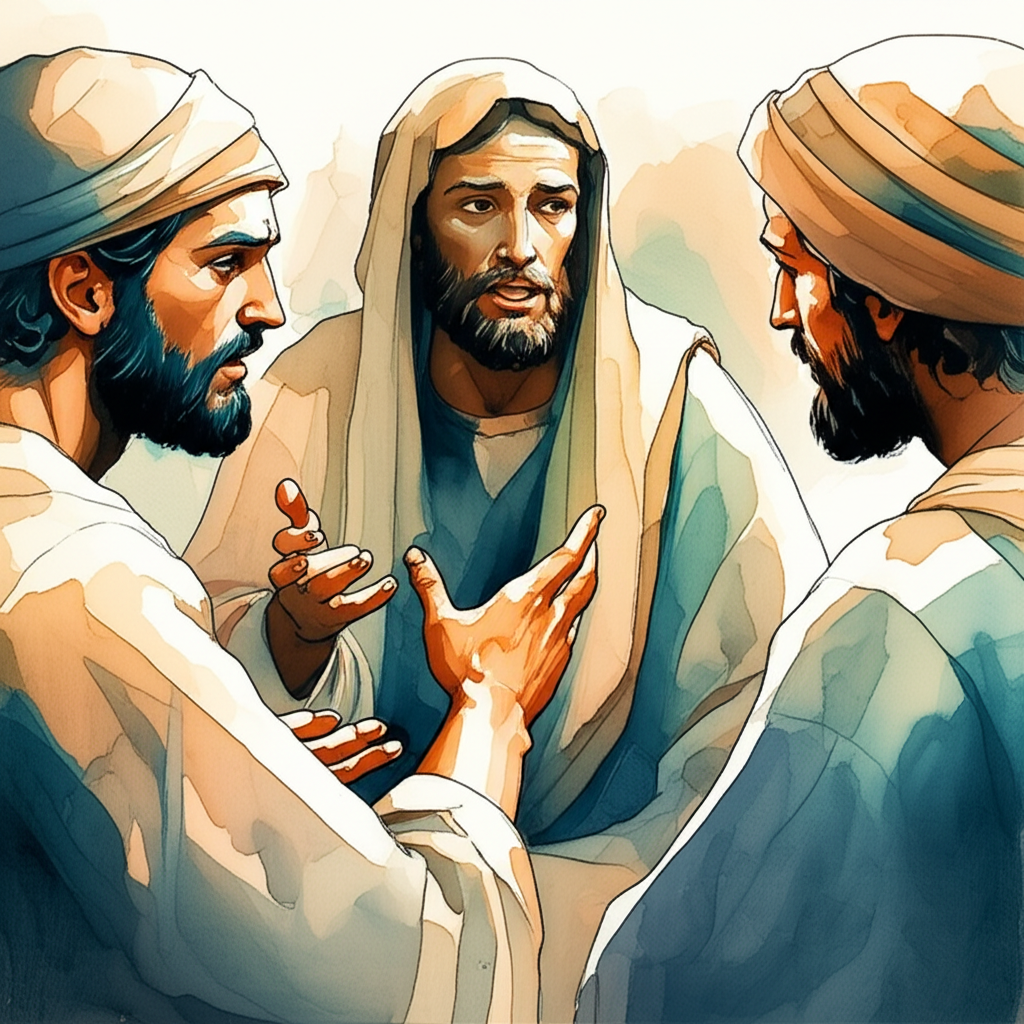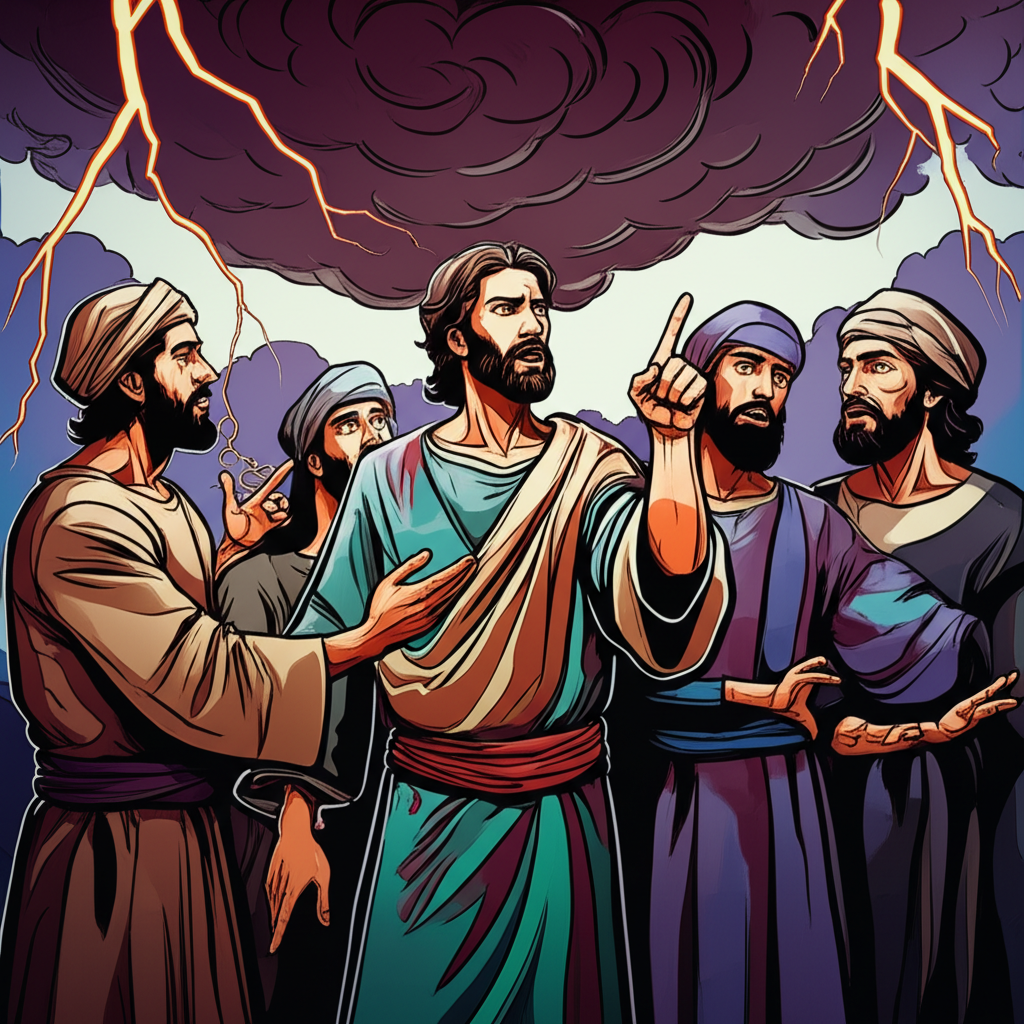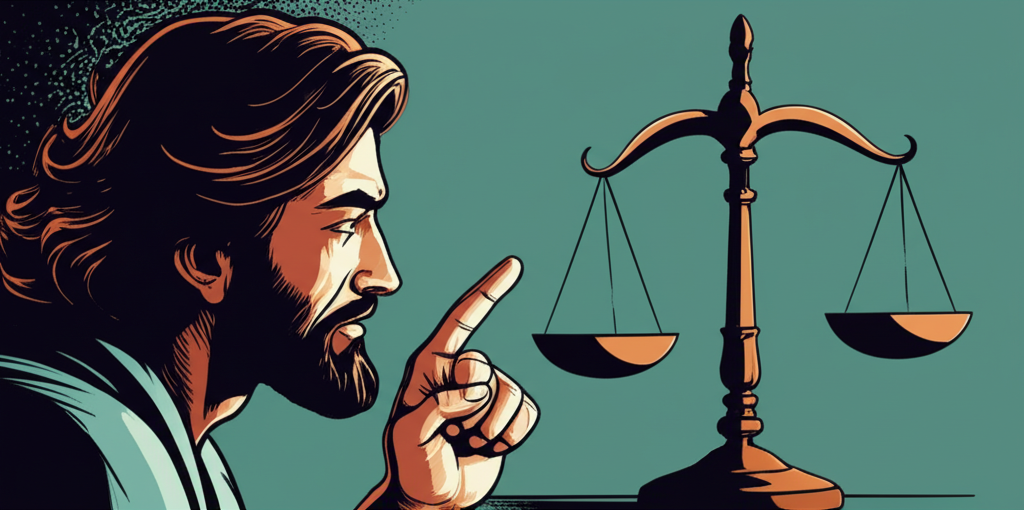Job 9 meaning explained in AI Summary
Job continues his response to Bildad in this chapter, focusing on the overwhelming power and sovereignty of God. He argues that it's pointless for a human to question God's justice because:
- God is infinitely powerful: Job acknowledges God's absolute power over creation. He controls the stars, the sea, the weather, and even death. No one can challenge or comprehend His might. (verses 4-13)
- God is unsearchable: Job emphasizes the vast difference between God's understanding and human understanding. He argues that even if he were innocent and tried to plead his case, God is too great to be swayed by human arguments. (verses 14-21)
- God is impartial: Job recognizes that God doesn't show favoritism. He treats the wicked and the righteous alike in their mortality. This realization leads Job to a place of despair, feeling helpless and unable to prove his righteousness. (verses 22-31)
- Job longs for a mediator: He expresses a desire for an impartial mediator between himself and God, someone who could help him understand God's actions and plead his case. (verses 32-35)
Overall, Chapter 9 highlights Job's struggle with the seeming injustice of his suffering. He acknowledges God's power and sovereignty but grapples with the lack of clear answers and the feeling of being unjustly punished. Despite his despair, a glimmer of hope emerges in his longing for a mediator, hinting at a possible path towards reconciliation with God.
Job 9 bible study ai commentary
Job 9 presents Job’s response to Bildad, moving from a lament of personal suffering to a profound theological argument about the nature of God and humanity. Job concedes God's infinite power and wisdom but argues this very omnipotence makes a fair hearing impossible for a mortal. Man cannot be declared righteous before such a God because the power dynamic is infinitely skewed. The chapter culminates in Job's desperate, prophetic cry for a mediator—an umpire who can stand between the divine and the human—foreshadowing a central theme of New Testament theology.
Job 9 context
Job's speech is set within a wisdom debate, responding to the rigid "Law of Retribution" promoted by his friends, who insist suffering is always a direct result of sin. The book is likely set in a pre-Mosaic, patriarchal era (land of Uz, a non-Israelite protagonist), explaining the absence of references to the Law or the covenant with Israel. The arguments draw on universal observations of nature and justice. Poetically, Job utilizes courtroom language to frame his plea, casting God as the unapproachable judge and himself as the helpless defendant. He also engages in polemics against the surrounding Ancient Near Eastern beliefs by portraying Yahweh's effortless control over creation (sun, stars, sea monster 'Rahab'), in contrast to pagan myths where gods struggle to subdue these forces.
Job 9:1-4
Then Job answered and said: "Truly I know that it is so: But how can a man be in the right before God? If one wished to contend with him, one could not answer him once in a thousand times. He is wise in heart and mighty in strength— who has hardened himself against him, and succeeded?"
In-depth-analysis
- Job's Concession: Job begins by agreeing with Bildad's premise of God's power ("I know that it is so"). His argument is not with God's might, but with the implication of that might for justice.
- The Core Question: The central theme is stated immediately: "How can a man be in the right (Hebrew: yiṣdāq) before God?" The word tsadaq means to be just, righteous, or vindicated in a legal sense.
- Futility of Argument: To contend (
rîḇ) with God is pointless. The odds ("one could not answer...once in a thousand times") are a hyperbole for absolute impossibility. A human cannot win a legal debate with his creator. - Divine Attributes: Job affirms God is "wise in heart and mighty in strength." This is not praise but the foundation of his complaint. God's infinite wisdom and strength make any challenge futile and any hope of a fair trial vanish. No one has ever successfully defied God.
Bible references
- Psa 143:2: 'Enter not into judgment with your servant, for no one living is righteous before you.' (Directly echoes Job's central question).
- Rom 3:20: 'For by works of the law no human being will be justified in his sight, since through the law comes knowledge of sin.' (NT theological answer to Job's dilemma).
- 1 Cor 1:25: 'For the foolishness of God is wiser than men, and the weakness of God is stronger than men.' (Reaffirms the infinite gap between divine and human capabilities).
Cross references
Isa 40:13-14 (God's unsearchable wisdom), Psa 130:3 (if God kept record of sins), Dan 4:35 (God's unstoppable sovereignty).
Job 9:5-10
“...he who removes mountains, and they know it not, when he overturns them in his anger, who shakes the earth out of its place, and its pillars tremble; who commands the sun, and it does not rise; who seals up the stars; who alone stretched out the heavens and trampled the waves of the sea; who made the Bear and Orion, the Pleiades and the chambers of the south; who does great things beyond searching out, and marvelous things beyond number.”
In-depth-analysis
- Cosmic Power: Job illustrates God's omnipotence using dramatic examples from nature: seismology (moves mountains, shakes earth), astronomy (commands sun and stars), and cosmology (stretches out heavens).
- Effortless Dominion: God's actions are sudden and unannounced ("they know it not"). His power is not a struggle but an effortless act of will.
- Polemic against Paganism:
- Trampled the waves of the sea: The sea (Heb. yam) was often personified as a chaotic, divine force in Canaanite and Mesopotamian myths (e.g., Tiamat, Yam). Job declares that God effortlessly dominates it.
- Stars and Constellations: He names specific, well-known constellations (
'ash- Bear,k'sil- Orion,kimah- Pleiades). These were often objects of worship or astrological divination. Job asserts God is their creator, not a fellow deity among them.
- Unsearchable God: The passage concludes by stating God's works are "beyond searching out" and "beyond number," reinforcing the theme from v.3 that God is too vast to be comprehended or challenged.
Bible references
- Amos 5:8: 'he who made the Pleiades and Orion, and turns deep darkness into the morning...' (Another prophet attributing the constellations' existence to Yahweh).
- Matt 14:25: 'And in the fourth watch of the night he came to them, walking on the sea.' (Jesus demonstrates this uniquely divine power, echoing Job's description).
- Psa 104:2-5: '...who stretched out the heavens like a tent... he set the earth on its foundations, so that it should never be moved.' (Parallels God as the sovereign Creator and Sustainer).
Cross references
Isa 40:22, 26 (heavens and stars), Hab 3:6 (mountains scattered), Heb 1:3 (upholding the universe), Rev 6:12-14 (cosmic upheaval in judgment).
Polemics: Scholars highlight that Job's description of God's power over the sea and heavens is a direct theological challenge to the Baal cycle from Ugaritic texts, where the storm-god Baal battles the sea-god Yam. For Job's God, there is no battle; there is only absolute, effortless sovereignty.
Job 9:11-13
“Behold, he passes by me, and I do not see him; he moves on, but I do not perceive him. Behold, he snatches away; who can turn him back? Who will say to him, ‘What are you doing?’ God will not turn back his anger; beneath him bowed the helpers of Rahab.”
In-depth-analysis
- God's Invisibility: God is not only all-powerful but also imperceptible. His presence is real ("he passes by") but beyond human senses, adding to Job's frustration.
- Sovereign Action: God "snatches away" and cannot be questioned or stopped ("Who can turn him back?"). This refers to his possessions, his children, and his health, which were taken without explanation.
- Helpers of Rahab: "Rahab" (
rāhab) is a term for a mythical sea monster, a symbol of primordial chaos and defiant pride, similar to Leviathan. By stating that even Rahab's "helpers" are crushed beneath God, Job is using powerful mythological imagery to describe God's absolute supremacy over any and every opposing force.
Bible references
- Isa 45:9: '"Woe to him who strives with his Maker, an earthen vessel with the potter! Does the clay say to him who forms it, ‘What are you making?"' (Parallels the futility of questioning God's actions).
- Psa 89:10: 'You crushed Rahab like a carcass; you scattered your enemies with your mighty arm.' (Confirms Rahab as a symbol of an enemy force subdued by God).
- Dan 4:35: '...he does according to his will among the host of heaven and among the inhabitants of the earth; and none can stay his hand...' (Echoes God's irresistible sovereignty).
Cross references
Job 23:8-9 (God is unseen), Job 26:12 (dividing the sea and smiting Rahab), Isa 30:7 (Egypt called "Rahab who sits still"), Psa 74:13-14.
Job 9:14-21
“How then can I answer him, choosing my words with him? Though I am in the right, I cannot answer him; I must appeal for mercy to my accuser. If I summoned him and he answered me, I would not believe that he was listening to my voice. For he crushes me with a tempest and multiplies my wounds without cause. He will not let me get my breath, but fills me with bitterness. If it is a contest of strength, behold, he is mighty! If it is a matter of justice, who can summon him? Though I am in the right, my own mouth would condemn me; though I am blameless, he would prove me perverse.”
In-depth-analysis
- Legal Hopelessness: Job returns to the courtroom metaphor. He cannot even formulate a defense ("choosing my words") against such a being.
- Paradox of Innocence: The key phrase is, "Though I am in the right (Heb. ṣāḏāqətî), I cannot answer him." His objective innocence is meaningless in this divine court. His only option is to "appeal for mercy," which would imply guilt.
- God as Adversary: Job's judge is also his "accuser" (or opponent in a lawsuit). The roles are merged, making a fair trial impossible.
- No Grounds for Contest: Whether a contest of strength or a trial of justice, God holds all the power. The question, "who can summon him?" highlights a critical flaw in Job's case: you cannot subpoena God.
- Self-Condemnation: The ultimate futility: "Though I am in the right, my own mouth would condemn me." In the face of God's overwhelming presence and power, any attempt at self-defense would seem arrogant and perverse, thus proving God's (assumed) case against him.
Bible references
- 1 Cor 4:4: 'My conscience is clear, but that does not make me innocent. It is the Lord who judges me.' (Paul expresses a similar sentiment: human self-assessment is insufficient for ultimate justification).
- Rom 8:33-34: 'Who shall bring any charge against God's elect? It is God who justifies. Who is to condemn?' (Provides the Christian answer: the Judge has become the Justifier through Christ).
- Isa 53:7: 'He was oppressed, and he was afflicted, yet he opened not his mouth...' (Contrasts Job's desperate attempt to speak with the silent submission of the Suffering Servant).
Cross references
Job 10:15 (if righteous, I cannot lift my head), Psa 38:4 (iniquities overwhelming), Psa 130:3.
Job 9:22-24
“It is all one; therefore I say, ‘He destroys both the blameless and the wicked.’ If the scourge slays suddenly, he mocks at the calamity of the innocent. The earth is given into the hand of the wicked; he covers the faces of its judges. If it is not he, who then is it?”
In-depth-analysis
- The Scandalous Claim: "It is all one" is Job's direct refutation of the doctrine of retribution. He claims God treats the blameless (
tām) and the wicked (rāšāʿ) alike. This is one of the most radical and challenging statements in the book. - Divine Indifference: Job goes further, accusing God of mocking the suffering of the innocent when a "scourge" (disaster, plague) strikes. This is Job's raw, painful interpretation of what he sees happening in the world.
- Cosmic Injustice: "The earth is given into the hand of the wicked" and God "covers the faces of its judges" (blinds them to justice). Job attributes the world's injustices not to God's absence, but to His sovereign, and inscrutable, permission.
- Rhetorical Challenge: "If it is not he, who then is it?" This is a powerful conclusion. Job insists on God's absolute sovereignty. If God is not responsible for the state of the world, then who is? There is no one else.
Bible references
- Ecc 9:2: 'It is the same for all, since a single event happens to the righteous and the wicked, to the good and the clean...' (The Preacher observes the same seeming randomness of fate).
- Luke 13:4-5: '...those eighteen on whom the tower in Siloam fell...do you think that they were worse offenders than all the others who lived in Jerusalem? No, I tell you...' (Jesus directly refutes the simplistic view that tragedy only befalls the singularly sinful).
- Hab 1:13: 'You who are of purer eyes than to see evil and cannot look at wrong, why do you idly look at traitors and are silent when the wicked swallows up the man more righteous than he?' (The prophet Habakkuk asks the same kind of question as Job).
Cross references
Jer 12:1 (why does the way of the wicked prosper?), Mal 3:15 (evildoers prosper), Psa 73:3-5 (envy of the wicked's prosperity).
Job 9:25-31
“My days are swifter than a runner; they flee away; they see no good. They go by like skiffs of reed, like an eagle that swoops on the prey. If I say, ‘I will forget my complaint, I will put off my sad face, and be of good cheer,’ I become afraid of all my suffering, for I know you will not hold me innocent. I am counted guilty; why then do I labor in vain? If I wash myself with snow and cleanse my hands with lye, you will plunge me into a ditch, and my own clothes will abhor me.”
In-depth-analysis
- Fleeting Life: Job uses three powerful metaphors for the swift, empty passage of his life: a runner, fast reed skiffs (used on the Nile), and a hunting eagle. His life is rushing to its end without joy.
- The Impossibility of Escape: Even a conscious decision to be happy is doomed. The memory of his pain and the knowledge of God's unyielding judgment ("you will not hold me innocent") make joy impossible.
- Futile Cleansing: This is a crucial metaphor. "Snow water" was considered exceptionally pure. "Lye" (or soap) was the strongest cleansing agent known. Job says that even if he could perform the most radical act of self-purification, God would just plunge him back into a filthy pit (
šaḥat). - Permanent Stain: By human effort, innocence cannot be restored or maintained before God. Any attempt at cleansing only highlights the filth. This anticipates the theological concept that only a divine act can truly cleanse a person.
Bible references
- Jer 2:22: ‘Though you wash yourself with lye and use much soap, the stain of your guilt is still before me, declares the Lord GOD.’ (A direct prophetic parallel to Job's metaphor).
- Psa 51:7: 'Purge me with hyssop, and I shall be clean; wash me, and I shall be whiter than snow.' (David recognizes that only God can perform the cleansing that Job feels is impossible).
- Jas 4:14: '...what is your life? For you are a mist that appears for a little time and then vanishes.' (Echoes the theme of life's brevity).
Cross references
Psa 39:5 (life as a breath), Psa 90:9-10 (life's swiftness), Isa 1:16-18 (call to be washed by God).
Job 9:32-35
“For he is not a man, as I am, that I might answer him, that we should come to trial together. There is no arbiter between us, who might lay his hand on us both. Let him take his rod away from me, and let not dread of him terrify me. Then I would speak without fear of him, for I am not so in myself.”
In-depth-analysis
- The Fundamental Chasm: Job clearly states the core problem: "He is not a man, as I am." There is no common ground for a fair trial between the finite and the infinite.
- The Cry for a Mediator: The word for "arbiter" is the Hebrew participle
môkîaḥ, meaning one who decides, judges, or acts as an umpire. Job's longing is for a third party who is a peer to both God and man—one who can "lay his hand on us both," signifying the authority to mediate and bring two opposing parties together. This is one of the most significant Christological foreshadowings in the Old Testament. - Conditions for a Fair Hearing: Job specifies what he needs to plead his case: 1) A mediator (
môkîaḥ). 2) The removal of God's "rod" (his terrifying, punishing power). 3) The removal of the dread (’êmâ) God inspires. - Inward Confidence: "For I am not so in myself" is a difficult phrase. It likely means, "I am not inwardly the guilty man my circumstances suggest," or "Left to myself, I am not fearful." He asserts his fundamental integrity, which he believes he could demonstrate if the conditions were fair.
Bible references
- 1 Tim 2:5: 'For there is one God, and there is one mediator between God and men, the man Christ Jesus.' (The ultimate and direct fulfillment of Job's cry for a
môkîaḥ). - Heb 4:15-16: 'For we do not have a high priest who is unable to sympathize with our weaknesses, but one who... has been tempted as we are... Let us then with confidence draw near to the throne of grace...' (Describes Jesus as the very mediator Job longed for, who removes fear and allows us to approach God).
- Gal 3:20: 'Now an intermediary implies more than one, but God is one.' (Paul's theological discussion on the role of a mediator in the context of the Law and the Promise).
Cross references
Job 16:21 (longing for one to plead for a man with God), Heb 7:25 (Christ's intercession), Heb 12:24 (Jesus, the mediator of a new covenant).
Job 9 analysis
- The Anti-Retribution Argument: Job chapter 9 is a systematic dismantling of the simplistic theology of his friends. Job uses his observation of the world (v. 22-24) and his own experience to argue that God’s governance is far more mysterious and less predictable than the Law of Retribution allows.
- The Logic of Mediation: Job's reasoning progresses with devastating logic. If God is all-powerful (v. 5-10), and man is finite and flawed (v. 2), a fair trial is impossible (v. 14-21). Man cannot purify himself (v. 30-31). Therefore, the only possible solution is the existence of an external party, a mediator who can bridge the infinite gap (v. 33). This is a theological argument born from despair that points directly to grace.
- God's Sovereignty Redefined: For Job’s friends, sovereignty meant a tidy moral order. For Job, sovereignty is raw, untamable, and terrifying power that operates by rules he cannot perceive. His honesty forces a more complex and ultimately more biblical view of God, who is not a cosmic vending machine but the unsearchable Creator.
Job 9 summary
Job acknowledges God's absolute power and wisdom but argues that these very attributes make it impossible for a mortal to be justified before Him. He describes God's terrifying might over creation, protests that God seems to afflict the innocent and the wicked indiscriminately, and concludes that no amount of self-purification can make him clean. The chapter's climax is Job’s desperate and prophetic plea for an impartial mediator, an arbiter who can stand between him and God, bridging the infinite chasm that separates them.
Job 9 AI Image Audio and Video










Job chapter 9 kjv
- 1 Then Job answered and said,
- 2 I know it is so of a truth: but how should man be just with God?
- 3 If he will contend with him, he cannot answer him one of a thousand.
- 4 He is wise in heart, and mighty in strength: who hath hardened himself against him, and hath prospered?
- 5 Which removeth the mountains, and they know not: which overturneth them in his anger.
- 6 Which shaketh the earth out of her place, and the pillars thereof tremble.
- 7 Which commandeth the sun, and it riseth not; and sealeth up the stars.
- 8 Which alone spreadeth out the heavens, and treadeth upon the waves of the sea.
- 9 Which maketh Arcturus, Orion, and Pleiades, and the chambers of the south.
- 10 Which doeth great things past finding out; yea, and wonders without number.
- 11 Lo, he goeth by me, and I see him not: he passeth on also, but I perceive him not.
- 12 Behold, he taketh away, who can hinder him? who will say unto him, What doest thou?
- 13 If God will not withdraw his anger, the proud helpers do stoop under him.
- 14 How much less shall I answer him, and choose out my words to reason with him?
- 15 Whom, though I were righteous, yet would I not answer, but I would make supplication to my judge.
- 16 If I had called, and he had answered me; yet would I not believe that he had hearkened unto my voice.
- 17 For he breaketh me with a tempest, and multiplieth my wounds without cause.
- 18 He will not suffer me to take my breath, but filleth me with bitterness.
- 19 If I speak of strength, lo, he is strong: and if of judgment, who shall set me a time to plead?
- 20 If I justify myself, mine own mouth shall condemn me: if I say, I am perfect, it shall also prove me perverse.
- 21 Though I were perfect, yet would I not know my soul: I would despise my life.
- 22 This is one thing, therefore I said it, He destroyeth the perfect and the wicked.
- 23 If the scourge slay suddenly, he will laugh at the trial of the innocent.
- 24 The earth is given into the hand of the wicked: he covereth the faces of the judges thereof; if not, where, and who is he?
- 25 Now my days are swifter than a post: they flee away, they see no good.
- 26 They are passed away as the swift ships: as the eagle that hasteth to the prey.
- 27 If I say, I will forget my complaint, I will leave off my heaviness, and comfort myself:
- 28 I am afraid of all my sorrows, I know that thou wilt not hold me innocent.
- 29 If I be wicked, why then labour I in vain?
- 30 If I wash myself with snow water, and make my hands never so clean;
- 31 Yet shalt thou plunge me in the ditch, and mine own clothes shall abhor me.
- 32 For he is not a man, as I am, that I should answer him, and we should come together in judgment.
- 33 Neither is there any daysman betwixt us, that might lay his hand upon us both.
- 34 Let him take his rod away from me, and let not his fear terrify me:
- 35 Then would I speak, and not fear him; but it is not so with me.
Job chapter 9 nkjv
- 1 Then Job answered and said:
- 2 "Truly I know it is so, But how can a man be righteous before God?
- 3 If one wished to contend with Him, He could not answer Him one time out of a thousand.
- 4 God is wise in heart and mighty in strength. Who has hardened himself against Him and prospered?
- 5 He removes the mountains, and they do not know When He overturns them in His anger;
- 6 He shakes the earth out of its place, And its pillars tremble;
- 7 He commands the sun, and it does not rise; He seals off the stars;
- 8 He alone spreads out the heavens, And treads on the waves of the sea;
- 9 He made the Bear, Orion, and the Pleiades, And the chambers of the south;
- 10 He does great things past finding out, Yes, wonders without number.
- 11 If He goes by me, I do not see Him; If He moves past, I do not perceive Him;
- 12 If He takes away, who can hinder Him? Who can say to Him, 'What are You doing?'
- 13 God will not withdraw His anger, The allies of the proud lie prostrate beneath Him.
- 14 "How then can I answer Him, And choose my words to reason with Him?
- 15 For though I were righteous, I could not answer Him; I would beg mercy of my Judge.
- 16 If I called and He answered me, I would not believe that He was listening to my voice.
- 17 For He crushes me with a tempest, And multiplies my wounds without cause.
- 18 He will not allow me to catch my breath, But fills me with bitterness.
- 19 If it is a matter of strength, indeed He is strong; And if of justice, who will appoint my day in court?
- 20 Though I were righteous, my own mouth would condemn me; Though I were blameless, it would prove me perverse.
- 21 "I am blameless, yet I do not know myself; I despise my life.
- 22 It is all one thing; Therefore I say, 'He destroys the blameless and the wicked.'
- 23 If the scourge slays suddenly, He laughs at the plight of the innocent.
- 24 The earth is given into the hand of the wicked. He covers the faces of its judges. If it is not He, who else could it be?
- 25 "Now my days are swifter than a runner; They flee away, they see no good.
- 26 They pass by like swift ships, Like an eagle swooping on its prey.
- 27 If I say, 'I will forget my complaint, I will put off my sad face and wear a smile,'
- 28 I am afraid of all my sufferings; I know that You will not hold me innocent.
- 29 If I am condemned, Why then do I labor in vain?
- 30 If I wash myself with snow water, And cleanse my hands with soap,
- 31 Yet You will plunge me into the pit, And my own clothes will abhor me.
- 32 "For He is not a man, as I am, That I may answer Him, And that we should go to court together.
- 33 Nor is there any mediator between us, Who may lay his hand on us both.
- 34 Let Him take His rod away from me, And do not let dread of Him terrify me.
- 35 Then I would speak and not fear Him, But it is not so with me.
Job chapter 9 niv
- 1 Then Job replied:
- 2 "Indeed, I know that this is true. But how can mere mortals prove their innocence before God?
- 3 Though they wished to dispute with him, they could not answer him one time out of a thousand.
- 4 His wisdom is profound, his power is vast. Who has resisted him and come out unscathed?
- 5 He moves mountains without their knowing it and overturns them in his anger.
- 6 He shakes the earth from its place and makes its pillars tremble.
- 7 He speaks to the sun and it does not shine; he seals off the light of the stars.
- 8 He alone stretches out the heavens and treads on the waves of the sea.
- 9 He is the Maker of the Bear and Orion, the Pleiades and the constellations of the south.
- 10 He performs wonders that cannot be fathomed, miracles that cannot be counted.
- 11 When he passes me, I cannot see him; when he goes by, I cannot perceive him.
- 12 If he snatches away, who can stop him? Who can say to him, 'What are you doing?'
- 13 God does not restrain his anger; even the cohorts of Rahab cowered at his feet.
- 14 "How then can I dispute with him? How can I find words to argue with him?
- 15 Though I were innocent, I could not answer him; I could only plead with my Judge for mercy.
- 16 Even if I summoned him and he responded, I do not believe he would give me a hearing.
- 17 He would crush me with a storm and multiply my wounds for no reason.
- 18 He would not let me catch my breath but would overwhelm me with misery.
- 19 If it is a matter of strength, he is mighty! And if it is a matter of justice, who can challenge him?
- 20 Even if I were innocent, my mouth would condemn me; if I were blameless, it would pronounce me guilty.
- 21 "Although I am blameless, I have no concern for myself; I despise my own life.
- 22 It is all the same; that is why I say, 'He destroys both the blameless and the wicked.'
- 23 When a scourge brings sudden death, he mocks the despair of the innocent.
- 24 When a land falls into the hands of the wicked, he blindfolds its judges. If it is not he, then who is it?
- 25 "My days are swifter than a runner; they fly away without a glimpse of joy.
- 26 They skim past like boats of papyrus, like eagles swooping down on their prey.
- 27 If I say, 'I will forget my complaint, I will change my expression, and smile,'
- 28 I still dread all my sufferings, for I know you will not hold me innocent.
- 29 Since I am already found guilty, why should I struggle in vain?
- 30 Even if I washed myself with soap and my hands with cleansing powder,
- 31 you would plunge me into a slime pit so that even my clothes would detest me.
- 32 "He is not a mere mortal like me that I might answer him, that we might confront each other in court.
- 33 If only there were someone to mediate between us, someone to bring us together,
- 34 someone to remove God's rod from me, so that his terror would frighten me no more.
- 35 Then I would speak up without fear of him, but as it now stands with me, I cannot.
Job chapter 9 esv
- 1 Then Job answered and said:
- 2 "Truly I know that it is so: But how can a man be in the right before God?
- 3 If one wished to contend with him, one could not answer him once in a thousand times.
- 4 He is wise in heart and mighty in strength ? who has hardened himself against him, and succeeded? ?
- 5 he who removes mountains, and they know it not, when he overturns them in his anger,
- 6 who shakes the earth out of its place, and its pillars tremble;
- 7 who commands the sun, and it does not rise; who seals up the stars;
- 8 who alone stretched out the heavens and trampled the waves of the sea;
- 9 who made the Bear and Orion, the Pleiades and the chambers of the south;
- 10 who does great things beyond searching out, and marvelous things beyond number.
- 11 Behold, he passes by me, and I see him not; he moves on, but I do not perceive him.
- 12 Behold, he snatches away; who can turn him back? Who will say to him, 'What are you doing?'
- 13 "God will not turn back his anger; beneath him bowed the helpers of Rahab.
- 14 How then can I answer him, choosing my words with him?
- 15 Though I am in the right, I cannot answer him; I must appeal for mercy to my accuser.
- 16 If I summoned him and he answered me, I would not believe that he was listening to my voice.
- 17 For he crushes me with a tempest and multiplies my wounds without cause;
- 18 he will not let me get my breath, but fills me with bitterness.
- 19 If it is a contest of strength, behold, he is mighty! If it is a matter of justice, who can summon him?
- 20 Though I am in the right, my own mouth would condemn me; though I am blameless, he would prove me perverse.
- 21 I am blameless; I regard not myself; I loathe my life.
- 22 It is all one; therefore I say, 'He destroys both the blameless and the wicked.'
- 23 When disaster brings sudden death, he mocks at the calamity of the innocent.
- 24 The earth is given into the hand of the wicked; he covers the faces of its judges ? if it is not he, who then is it?
- 25 "My days are swifter than a runner; they flee away; they see no good.
- 26 They go by like skiffs of reed, like an eagle swooping on the prey.
- 27 If I say, 'I will forget my complaint, I will put off my sad face, and be of good cheer,'
- 28 I become afraid of all my suffering, for I know you will not hold me innocent.
- 29 I shall be condemned; why then do I labor in vain?
- 30 If I wash myself with snow and cleanse my hands with lye,
- 31 yet you will plunge me into a pit, and my own clothes will abhor me.
- 32 For he is not a man, as I am, that I might answer him, that we should come to trial together.
- 33 There is no arbiter between us, who might lay his hand on us both.
- 34 Let him take his rod away from me, and let not dread of him terrify me.
- 35 Then I would speak without fear of him, for I am not so in myself.
Job chapter 9 nlt
- 1 Then Job spoke again:
- 2 "Yes, I know all this is true in principle.
But how can a person be declared innocent in God's sight? - 3 If someone wanted to take God to court,
would it be possible to answer him even once in a thousand times? - 4 For God is so wise and so mighty.
Who has ever challenged him successfully? - 5 "Without warning, he moves the mountains,
overturning them in his anger. - 6 He shakes the earth from its place,
and its foundations tremble. - 7 If he commands it, the sun won't rise
and the stars won't shine. - 8 He alone has spread out the heavens
and marches on the waves of the sea. - 9 He made all the stars ? the Bear and Orion,
the Pleiades and the constellations of the southern sky. - 10 He does great things too marvelous to understand.
He performs countless miracles. - 11 "Yet when he comes near, I cannot see him.
When he moves by, I do not see him go. - 12 If he snatches someone in death, who can stop him?
Who dares to ask, 'What are you doing?' - 13 And God does not restrain his anger.
Even the monsters of the sea are crushed beneath his feet. - 14 "So who am I, that I should try to answer God
or even reason with him? - 15 Even if I were right, I would have no defense.
I could only plead for mercy. - 16 And even if I summoned him and he responded,
I'm not sure he would listen to me. - 17 For he attacks me with a storm
and repeatedly wounds me without cause. - 18 He will not let me catch my breath,
but fills me instead with bitter sorrows. - 19 If it's a question of strength, he's the strong one.
If it's a matter of justice, who dares to summon him to court? - 20 Though I am innocent, my own mouth would pronounce me guilty.
Though I am blameless, it would prove me wicked. - 21 "I am innocent,
but it makes no difference to me ?
I despise my life. - 22 Innocent or wicked, it is all the same to God.
That's why I say, 'He destroys both the blameless and the wicked.' - 23 When a plague sweeps through,
he laughs at the death of the innocent. - 24 The whole earth is in the hands of the wicked,
and God blinds the eyes of the judges.
If he's not the one who does it, who is? - 25 "My life passes more swiftly than a runner.
It flees away without a glimpse of happiness. - 26 It disappears like a swift papyrus boat,
like an eagle swooping down on its prey. - 27 If I decided to forget my complaints,
to put away my sad face and be cheerful, - 28 I would still dread all the pain,
for I know you will not find me innocent, O God. - 29 Whatever happens, I will be found guilty.
So what's the use of trying? - 30 Even if I were to wash myself with soap
and clean my hands with lye, - 31 you would plunge me into a muddy ditch,
and my own filthy clothing would hate me. - 32 "God is not a mortal like me,
so I cannot argue with him or take him to trial. - 33 If only there were a mediator between us,
someone who could bring us together. - 34 The mediator could make God stop beating me,
and I would no longer live in terror of his punishment. - 35 Then I could speak to him without fear,
but I cannot do that in my own strength.
- Bible Book of Job
- 1 Story of Job
- 2 Satan Attacks Job's Health
- 3 Job Laments His Birth
- 4 Eliphaz Speaks: The Innocent Prosper
- 5 Call now; is there anyone who will answer you? To which of the holy ones will
- 6 Job Replies: My Complaint Is Just
- 7 Job Continues: My Life Has No Hope
- 8 Bildad Speaks: Job Should Repent
- 9 Job Replies: There Is No Arbiter
- 10 Job Continues: A Plea to God
- 11 Zophar Speaks: You Deserve Worse
- 12 Job Replies: The Lord Has Done This
- 13 Job Continues: Still I Will Hope in God
- 14 Job Continues: Death Comes Soon to All
- 15 Eliphaz Accuses: Job Does Not Fear God
- 16 Job Replies: Miserable Comforters Are You
- 17 Job Continues: Where Then Is My Hope?
- 18 Bildad Speaks: God Punishes the Wicked
- 19 Job Replies: My Redeemer Lives
- 20 Zophar Speaks: The Wicked Will Suffer
- 21 Job Replies: The Wicked Do Prosper
- 22 Eliphaz Speaks: Job's Wickedness Is Great
- 23 Job Replies: Where Is God?
- 24 Why are not times of judgment kept by the Almighty, and why do those who know
- 25 Bildad Speaks: Man Cannot Be Righteous
- 26 Job Replies: God's Majesty Is Unsearchable
- 27 Job Continues: I Will Maintain My Integrity
- 28 Job Continues: Where Is Wisdom?
- 29 Job's Summary Defense
- 30 But now they laugh at me, men who are younger than I, whose fathers I would
- 31 Covenant with my Eyes
- 32 Elihu Rebukes Job's Three Friends
- 33 Elihu Rebukes Job
- 34 Elihu Asserts God's Justice
- 35 Elihu Condemns Job
- 36 Elihu Extols God's Greatness
- 37 Elihu Proclaims God's Majesty
- 38 Job questions God
- 39 Do you know when the mountain goats give birth? Do you observe the calving of
- 40 Job Promises Silence
- 41 Lord's challenge of Leviathan
- 42 Job's Repentance and Restoration